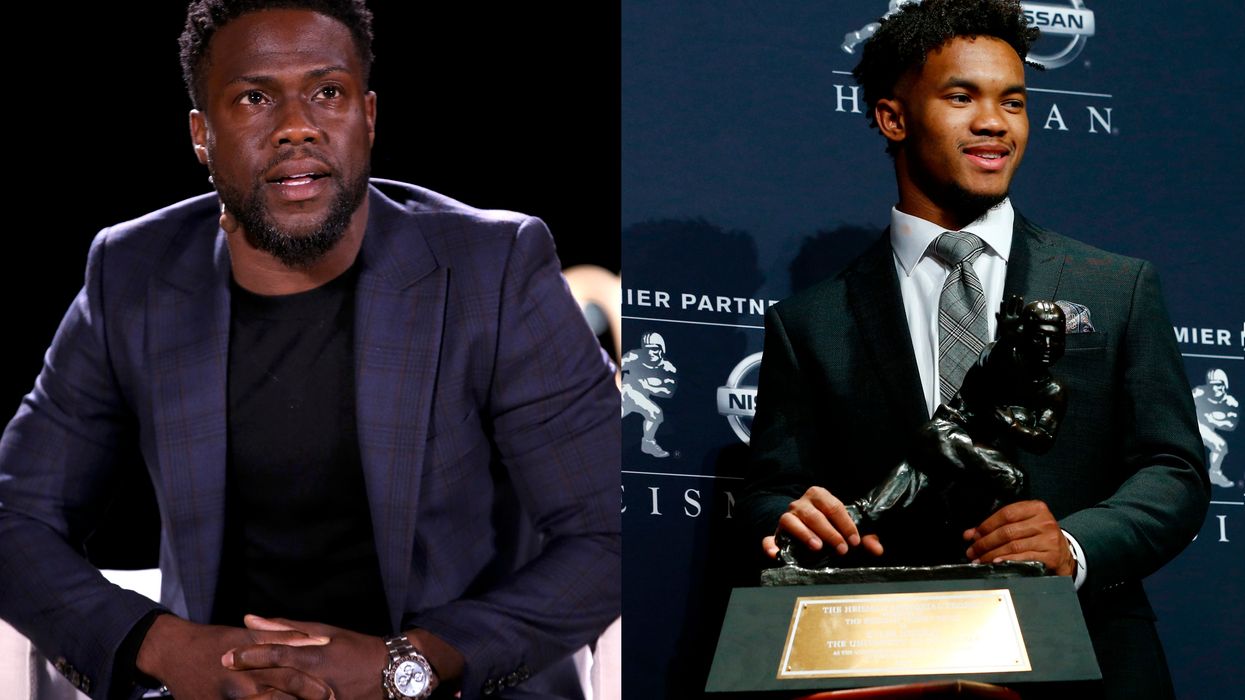
Photo of Kevin Hart (left) by Phillip Faraone/Getty Images for The Wall Street Journal and WSJ. Magazine) . Photo of Kyler Murray (right) by Mike Stobe/Getty Images.

Some questions to consider
Over the past several days, two public figures have had to answer for the content of old social media posts after major career milestones.
Saturday, University of Oklahoma quarterback Kyler Murray won the Heisman Trophy, the award given to the most outstanding player in college football. Shortly after receiving the award, several tweets in which Murray used the word "queer" or "queers" as an insult surfaced and were published in mainstream media outlets. The posts were from 2011 and 2012, when Murray was 14 and 15 years old.
Friday, after being named the host of the 2019 Academy Awards, comedian Kevin Hart stepped down from that role in response to backlash for tweets from 2010 and 2011. In one tweet he wrote about preventing his son from playing with a dollhouse because "that's gay." In others he wrote that someone looked like a "gay billboard for AIDS," and called someone a "fat f*g."
It is becoming increasingly common for internet detectives to dig up problematic old social media posts when someone accomplishes something significant or gets a big-time job.
While people should be held accountable for what they post online, all situations are not created equal, and we should think carefully about how we report on these instances and what prices we demand public figures pay for words of their past.
Here are some helpful questions to ask when you find some old, potentially offensive social media posts and you're considering making a big deal about them:
Why am I about to publicize this? Do you want to publicize these old social media posts because there is a public need to know? Or did the subject of this report just do something newsworthy, making it a perfect time to take them down as clickbait while their name is trending? Eagerly breaking the news that a college football player tweeted "queers" six years ago on the night he wins a big award is opportunism, not journalism.
Was the author a child when they posted the allegedly offensive content? If the author of the offensive content was a child when they posted it, and in subsequent years the author has not indicated a pattern of negative behavior or poor character, rehashing old social media posts only harms the author while helping no one. The fact that a record of childhood foolishness exists online now doesn't change the fact that demanding adults apologize for stupid things they said as kids is asinine.
Is the author of the posts a comedian? This should go without saying, but much of what comedians (people who make a living by telling jokes) say should not be taken extremely seriously. Comedians, as a natural part of the job, will often say offensive, nasty, or off-color things. The content of Kevin Hart's tweets was not that different from what he has put in widely-distributed comedy specials over the years. Whether it's Kevin Hart or Michelle Wolf or anyone else, if you're about to get very upset about something a comedian said (especially if it was clearly a joke), take a breath and move on.
Are you willing to be consistent? It's easy to condemn someone for having said something that goes against your values and beliefs, or that you didn't find funny, because it offends you. But if personal offense is the standard for someone's condemnation or firing, will you be okay with that when it cuts in the other direction? When someone loses a job or opportunity for saying something you agree with but that offended someone else, will that be acceptable?
Remember: The goalposts move. Standards change. Something you say today will probably be considered offensive by someone else in the years to come. They won't care what your intention was, or what the cultural context was when you said it. Would you be okay getting fired for that? If not, be careful before throwing stones back in time at someone else's words.
Aaron Colen
Aaron is a former staff writer for TheBlaze. He resides in Denton, Texas, and is a graduate of the University of Oklahoma where he earned his Bachelor of Arts in journalism and a Master of Education in adult and higher education.